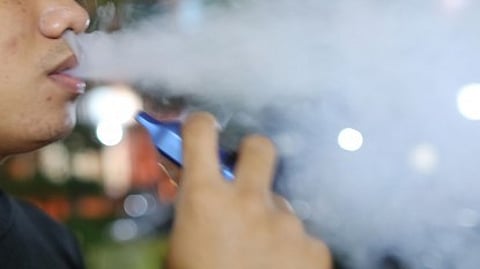
- NEWS
- the EDIT
- COMMENTARY
- BUSINESS
- LIFE
- SHOW
- ACTION
- GLOBAL GOALS
- SNAPS
- DYARYO TIRADA
- MORE

The Department of Trade and Industry (DTI) on Friday temporarily banned the online sale of all heated tobacco products (HTP) or vape, including devices and systems.
“It is a temporary suspension until the e-marketplaces are able to convince us of their compliance with their obligations under Republic Act 11900 [and] other laws and related issuances,” DTI Secretary Alfredo Pascual said in a media briefing in Makati City.
He said the main motivation for the order is to prevent the sale of vape products to minors and ensure that vape sellers are compliant with the products’ safety, particularly the testing of the devices by the Bureau of Philippine Standards.
“I just came from a meeting with importers, manufacturers, retailers, and distributors of vape products. [W]e talked about their experiences and problems. It’s a growing industry, they confirmed to me. [In terms of] physical selling, they’re able to comply with the requirement that no sale of vape products should be made to minors. [But] online, up to now, we’re not convinced the e-marketplaces are able to really screen the buyers of these products,” Pascual said.
The suspension order is effective immediately.
Voluntary moratorium
Pascual said some sellers have gone on a voluntary moratorium to work on a system that would assure the DTI they are able to screen minors.
“As you may know, in some countries, the online sale of vape products is fully prohibited. One good example is Singapore. Most of the regional offices of the large e-commerce platforms here, like Lazada, Shopee, and TikTok, are all based in Singapore, so they understand,” he said.
Besides e-commerce platforms, the trade chief said vapes are also sold on other websites, such as Facebook Market Place. The selling ban is indefinite.
Two requirements
Trade Assistant Secretary Amanda Nograles of the DTI Consumer Protection Group said that under the obligation of e-marketplaces, the sale of unregulated products should be prohibited unless sellers comply with two requirements.
“The first requirement is that they submit their registrations, licenses, and permits. So, in our order, we ask them to submit to us a copy of the licenses, permits, and BIR registrations of the online merchants in their marketplace,” she said.
“Second, it is necessary that before allowing regulated products like vapes to be sold on the e-marketplace, they must have a contract. Those who operate the e-marketplace have a contract as well as the online merchant regarding the selling restrictions, conditions, and everything under the law when it comes to selling vape.”
Nograles said the DTI made the determination based on their monitoring that found one of the laws vape sellers often violate is age-gating, which refers to the sale of the product to children under 18.
The Department of Health earlier warned the public on the use of vapes, as this is “dangerous to health” and “addicting.”
Last May, the Philippines recorded the first vape-related death after a 22-year-old male died of a heart attack due to a severe lung injury linked to his daily vape use for two years.
